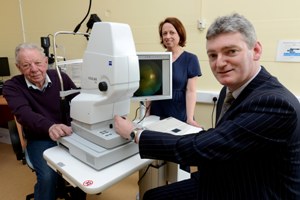 A cross border broadband project, which was to deliver faster speeds to Dundalk, was “mismanaged” according to Stormont MLAs.
A cross border broadband project, which was to deliver faster speeds to Dundalk, was “mismanaged” according to Stormont MLAs.
They found that a government department was more concerned with meeting grant-making targets than property examining claims for the broadband project.
Politicians in the north found that the cross-border high-speed Bytel scheme was appallingly mismanaged and claimed the Department of Enterprise, Trade and Investment’s oversight was unacceptable.
Equipment was bought for €1.3 million (£943,000) using public funds when the true value was €30,000 (£21,700), the Audit Office has said. The “virtually obsolete” apparatus was never used and the department lost €2 million (£1.4 million) after the EU withdrew funding.
The Public Accounts Committee (PAC) said: “Instead of properly examining grant claims to ensure they were appropriate and monies used properly, DETI were more concerned with internal pressures to meet grant expenditure targets.
“The committee has concluded that this was a fundamental failure on the part of DETI to meet its responsibilities.”
Public finances are under tight scrutiny amid major reductions in departmental spending and the crisis looming over the budget.
PAC chairwoman Michaela Boyle said: “The committee also found that investigations into what went wrong with the oversight of the project were completely inadequate, unacceptably delayed and did not go nearly far enough.
“Even at this stage, there has been no investigation leading to criminal proceedings.
“The appalling mismanagement of this project led to it delivering very poor value for money.”
The Belfast IT company behind the ambitious plan, Bytel, aimed to provide faster internet connections to homes in Belfast, Craigavon, Armagh, Dundalk and Dublin.
Although ineligible for funding, €1.3 million was given for equipment that was never used in the project, the Audit Office said. It was bought by Bytel from a “related” company, the audit office said, and evidence suggests it only cost €30,000.
The project, approved in 2004, was to be part-funded by the EU, but Europe withdrew because of irregular expenditure, DETI lost €2 million of EU funding and the Republic’s Department of Communications, Energy and Natural Resources sacrificed €1.8 million (£1.3 million).
Ms Boyle said: “The committee finds it very hard to believe that no one within the department has faced any disciplinary action for the many serious shortcomings in this project.
“This is not the first time that this committee has found poor management has cost the government vast sums of money.
“While we have been assured that management systems have been improved, we cannot afford, in this financial climate, to lose funding in this way.
“We are calling on the department, and indeed all government and non-governmental bodies, to implement rigorous systems to ensure that this cannot happen again and that those responsible are held accountable.”






